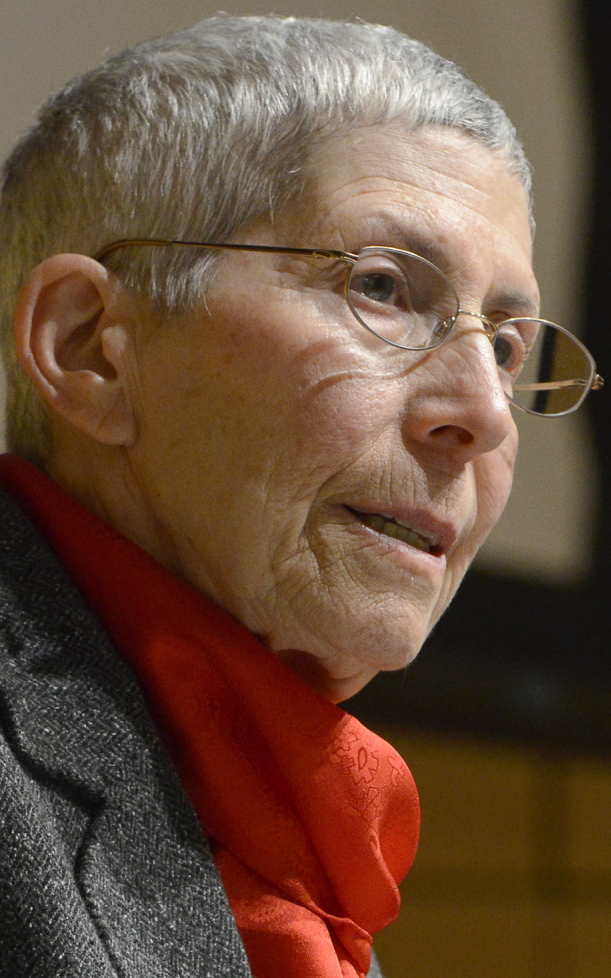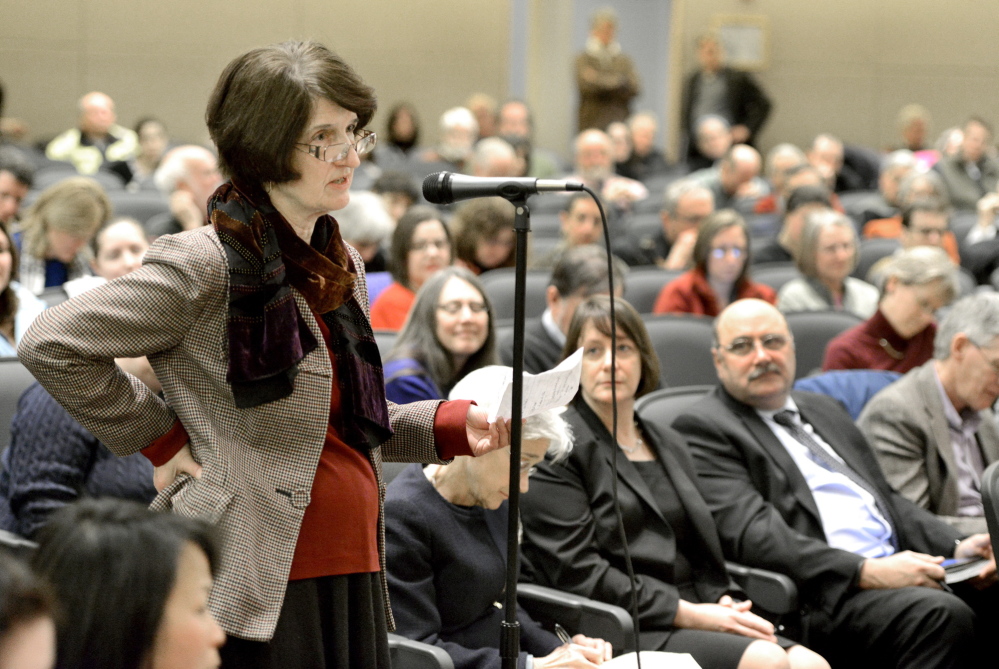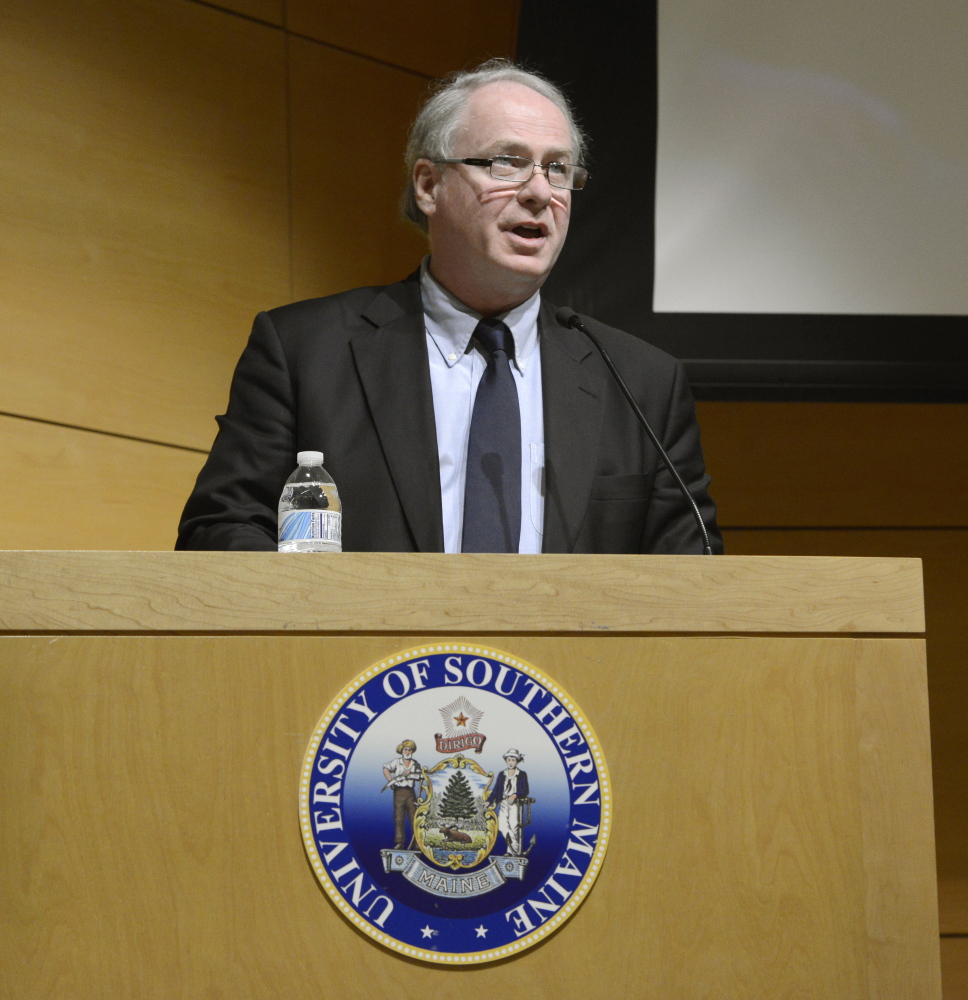The University of Southern Maine must evolve from a general liberal arts college to a streamlined “metropolitan university” that emphasizes its ties with local businesses, residents and government, President Theodora Kalikow said Wednesday.
“This is not just a marketing and (public relations) exercise,” Kalikow told several hundred people who gathered in Hannaford Hall for an all-campus meeting. “It’s a fundamental way to refocus.”
USM faces a $14 million budget shortfall for the year that starts July 1, part of a $36 million gap throughout the University of Maine System caused by flat state funding, declining enrollment and tuition freezes. Last week, Kalikow proposed cutting four academic programs and as many as 50 positions at USM.
“These are sober times,” UMaine System Chancellor James Page said at Wednesday’s meeting. “You have lots of hard work to do. We have lots of hard work to do. We’re with you in that.”
Tension rose after some university officials described the fiscal crisis – and the university – in business terms.
Rick Vail, a USM graduate who is chairman of the University of Southern Maine Foundation, was lightly booed and heckled when he told the crowd, “You are, in fact, a business.”
He said he “didn’t get” the concept of shared governance, in which the faculty and administration work together to guide universities.
“I’m disappointed” by letters to the editor and opinion pieces in the Portland Press Herald in which faculty members criticize the cuts, Vail said. “They add to my skepticism that shared governance can effect the change necessary for the benefit of all USM stakeholders.”
Edward McKersie, a member of the USM Foundation’s board, criticized “the public dysfunction” of discussing the budget cuts in the media.
Collectively, UMaine System trustees and USM officials argued that dramatic change is needed.
“Nibbling around the edges won’t work,” said Trustee Karl Turner. “And although some of you bridle at the notion of having a business orientation, students are our customers and, further, they pay our bills. We exist to serve these two constituencies: students and the people of Maine.”
FINDING A DISTINCT IDENTITY
Kalikow said it would take years to reposition USM as a metropolitan university, with programs emphasizing the school’s connection to Greater Portland. That vision includes increasing partnerships between USM and local businesses and agencies, and marketing the school as an urban experience that is unique in Maine.
The concept was borne out of a months-long evaluation by the faculty, staff and students that produced a “Direction Package,” proposing ways to raise revenue and cut costs.
As a metropolitan university, USM would direct students to use surrounding cities and towns “as living laboratories, thereby enriching their learning experience” and “contributing to the economic, civic and cultural life of Maine communities,” Kalikow has said.
Part of the change would be to the curriculum.
“Think of replacing our current array of small grad programs in the sciences with a professional science master’s complete with several clearly articulated tracks,” Kalikow said.
The changes would differentiate USM from the other UMaine System campuses. Orono now has a distinct identity as the flagship campus, Farmington is a classic liberal arts college and Machias is carving out an emphasis in environmental studies.
Page said it is part of a vision to end the system’s identity of “silo campuses” and become “a portfolio of programs and services.”
“That means not every campus can do everything,” he said. “In a time of scarce resources, we have to look at what we have across the system.”
Kalikow said the system is providing USM with $500,000 to start the metropolitan university effort, and a steering committee will be named by May.
CUTS UNDERWAY SYSTEMWIDE
Each of the seven campuses in the UMaine System has been given a target amount to cut for 2014-15, and campus officials will submit their budgets to the system office next month.
On Wednesday, University of Maine-Augusta officials announced that they would cut 24 positions, end several degree programs and drop two sports teams. Officials at the flagship campus in Orono said they had no immediate announcements about how they would close a $12 million gap.
Kalikow said last week that she has identified only about half of the $14 million in needed cuts to USM’s annual budget of $140 million.
Among the pending proposals are mothballing old dorms on the Gorham campus; closing the John Calvin Stevens-designed Stone House in Freeport, which houses the school’s Stonecoast creative writing master’s program; reducing tuition for out-of-state students to increase enrollment; and offering more online, evening and summer courses.
Page has said he will ask the trustees for one-time “bridge” funding to help close the gap. He said the money would come from a $15 million fund set aside for emergencies.
The systemwide budget will go to the trustees in May.
RESISTANCE, SADNESS AMID CHANGES
Although Kalikow asked for feedback on the metropolitan university idea, most speakers focused on the budget cuts.
Kalikow has proposed eliminating the American and New England studies graduate program; the geosciences and recreation-and-leisure studies majors at the Portland and Gorham campuses; and the arts and humanities major at Lewiston-Auburn College, which is part of USM.
“I’d like to have an answer for why we were singled out,” said David Jones, chairman of the Department of Recreation and Leisure Studies. He noted that the program is popular, growing and closely involved with the community.
Kalikow repeatedly said the cuts are unfortunate but necessary.
“It’s always very sad when you have to do this. We would like to preserve the full range of what we do,” she said. “But given the world that we actually live in today, where state support (has dropped) and students have to pay the rest, the equation for how we do our work has totally changed in the last 30 years or so. It is painful, it hurts students, it hurts faculty, and in some ways, it hurts society.”
Several speakers said they support some of the ideas.
English professor Nancy Gish said “everyone that I know is on board with metropolitan university, not the least because that’s what we’ve always been.”
Gish took issue with trustees’ comments about an open discussion of the changes. “Debate has to be transparent. If businesses were more transparent, we may not have had Enron and Bernie Madoff,” she said, referring to high-profile criminal cases.
Kalikow, who will announce more changes in the upcoming weeks, said she plans to meet with students Thursday for further discussion.
Noel K. Gallagher can be contacted at 791-6387 or at:
Send questions/comments to the editors.






Success. Please wait for the page to reload. If the page does not reload within 5 seconds, please refresh the page.
Enter your email and password to access comments.
Hi, to comment on stories you must . This profile is in addition to your subscription and website login.
Already have a commenting profile? .
Invalid username/password.
Please check your email to confirm and complete your registration.
Only subscribers are eligible to post comments. Please subscribe or login first for digital access. Here’s why.
Use the form below to reset your password. When you've submitted your account email, we will send an email with a reset code.